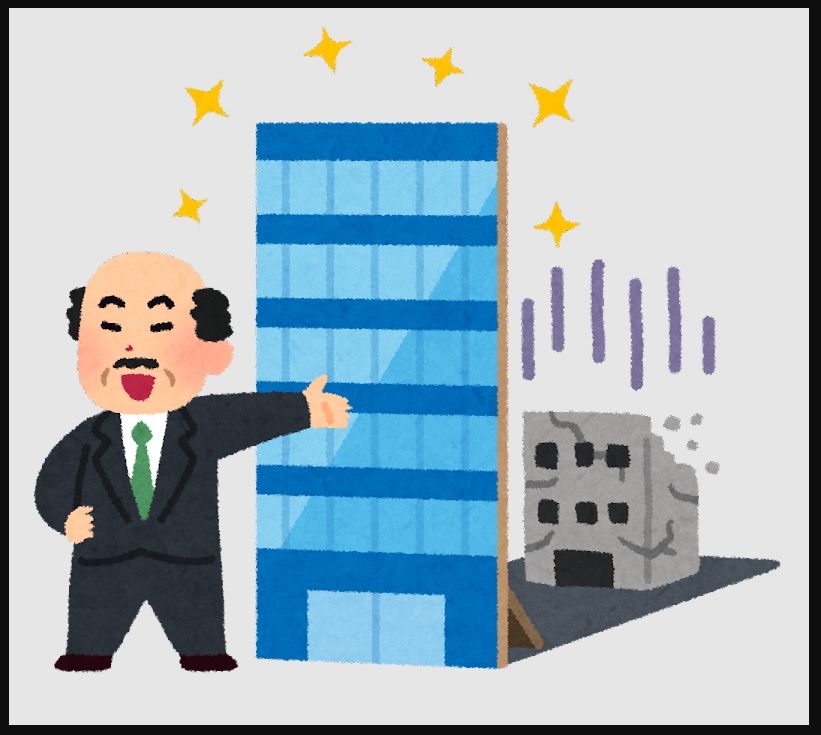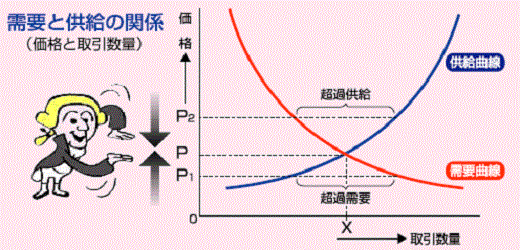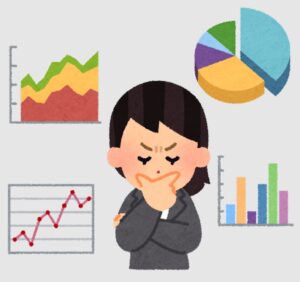「粉飾決算とは!?|株式投資の基本がわかる!上場企業と証券取引所の解説」
~前回のつづき~
●上場、それは“買われる資格”を得た証~買う自由の裏にある、企業の努力と信用~

上場企業というのは
株を証券取引所で売買できる企業
の事です。
(出典:https://baibull.net/wp/)
非上場=ベンチャーが
大体400万社あります。
上場している企業が
約3,500社ある。
厳しい審査を
突破した会社だけが
上場できる。
上場すると誰でも株式を
売買出来るようになります。
基本的には
株を買うというのは
上場企業の株を買う事になります。
だから
ベンチャー企業とか
個人事業なんかは
大体非上場企業です。
でも大企業の中にも
上場してない企業はあります。
・サントリー
・竹中工務店
・JTB
なんかがそうです。
誰でもその会社の株を
証券取引所で
売買出来るようになった企業の事を
『上場企業』と呼びます
誰でも
売買出来るようにする
という事なので
ちゃんとやってる企業じゃないと
売買出来ません。
●証券取引所=企業が世間に値踏みされる場所~企業の信用が値段に~

証券取引所とは?
有名なのは
東証=東京証券取引所ですね。
実際に株式が売買されている場所
という事ですね。
(株式売買フロー 出典 リベラルアーツ大学)
投資家がどこか
上場企業の株を
買おうとすると
直接その会社に
買い付けを入れる訳では
ありません。
証券取引所を通じて買う。
でも証券取引所も
直接私たちとやり取りして
売買する訳ではなくて
証券会社という所を通じて
買います。
なので
色んな所の証券会社がある。
証券口座すなわち
投資用銀行口座
みたいなのを開いて
間接的に売買していく
という流れになっています。
●登った先にも、ステージがある~プライムは選ばれし者、スタンダードは実力者、グロースは未来の賭け~

東証の中でも
カテゴリーがあり
・プライム市場
・スタンダード市場
・グロース市場
となっています。
ステージが
いくつか用意されている。
それぐらいで
覚えておいてもらえれば
大丈夫です。
東証の中で会社が
いくつかカテゴリーや
ジャンルで分けられている
ぐらいで覚えておけば
大丈夫です。
●株を買うとは、信用を値段で買うことだ~四半期に一度、企業は裸になる~

株を買うというのは
一般的に
上場企業を買う事を指します。
上場企業の株は
証券口座を通じて
誰でも買える。
有名企業は
結構上場しています。
上場していると
何がいいかと言うと
(1)市場から資金調達が出来る

色んな人達が
自分の会社の株を
買えるようになるので
一般の人達から
会社にお金が流れてくる。
(2)信用度や知名度が上がる

上場すると
それだけ厳しい審査が通ったという事で
信用される。
(3)経営の透明性が上がる

四半期=3ヶ月に1回決算書を出して
経理・決算の現状を
開示しなければなりません。
●粉飾とは信頼を現金化して燃やす行為~数字を盛った代償は、信用の崩壊~

『粉飾決算』というのを
たまに聞いたりするかもしれません。
粉飾決算というのは
色んなパターンがあります。
要は

売り上げや利益等の数字を操作する
という事です。
だから
上場企業が粉飾決算していると
市場の人たちが
誤った認識をして
投資に回す。
すると
その人達を騙した
という事になるので
上場企業の
粉飾決算というのは
普通の中小企業がやるよりも
罪が重くなります。
●株式投資は企業を信じて未来を買うギャンブル~成長が一瞬で利益にも損失にもなる~

株式投資の世界では
ソフトバンクやZOZOのように
特定の企業の株のことを
・個別株
・個別銘柄
と呼びます。
つまり一社ごとの株に
直接投資することを指します。
個別株は
その企業の業績やニュース
経営者の判断ひとつで
値動きが大きく変わる
『企業勝負』の世界。
うまくいけば
大きなリターンも狙えますが
逆にリスクもダイレクト。
信じる企業に
賭けるという意味では
株を買うことは
その企業の未来を
『買う』行為。
数字だけじゃない
『目利き力』が
問われる領域です。
●昔は資産家の遊び、今はワンコインで参戦OK~1株からあなたも“資本家側”に立てる~

では株は
いくらから買えるのか?
会社によりますが
数百円から購入は可能です。
以前は大体
数十万円必要でした。
時には
数百万円の場合もありました。
購入単位が
1,000株ずつでしたので
それぐらい必要でした。
今は
1株から購入できる
証券会社があります。
私はSBI証券を使っています。
住信SBIネット銀行と連動して
お金のやり取りが
割とスムーズに出来るので
気に入ってます。
●株価とは企業の成長に人間の欲望が乗っかった値段~成長と欲望が交差するリアル~

株価=株の値段です。
株はなぜ値段が上がるのか?
という話をします。
例)
資本金1,000万円で
スタートした会社で
1株1万円で発行された。
時価総額1,000万円。
5年で頑張って
利益を2,000万円出した。
そうすると
時価総額というのは
最初の1,000万円と足して
3,000万円になります。
という事は
言い方を変えると
1株1万円が
1株3万円の価値になった
という事です。
なので本来
株はギャンブルではなく
会社の成長と共に
価格を上げていく。
ギャンブルとは
根本的に違います。
ちゃんと成長して
価格というのは
本来上がっていく。
ただ実際は
ちょっとややこしいんですけど
未来の利益が加味されます。
例)
未来にこれからも
利益が上がり続けるだろうから
もっと欲しいという人が
沢山出てきたりだとか
一番当初の
1万円の時から持ってた人が
もう3倍になったのであれば
売りたいとか
色んな人の感情が入ってくる。
なので実際は
もっと価格というのは
単純に動くものではないのですが
結局は売り手と買い手との

(出典:https://ameblo.jp/awaji-u/image-12282674160-13957982376.html)
需要と供給で株価は決まります。
〜〜〜つづく〜〜〜
Special Thanks college president Ryo.

●おまけ
≪≪perplexityちゃんによる文章まとめ≫≫
上場企業とは、厳しい審査を経て証券取引所で株式を公開し、誰でも株を売買できる企業のことです。
上場することで資金調達や信用度の向上、経営の透明性が高まります。
一方で、粉飾決算などの不正があれば投資家の信頼は大きく損なわれます。
証券取引所にはプライム・スタンダード・グロースなどの市場があり、企業の規模や特徴に応じて分類されます。
株価は企業の業績だけでなく、将来性への期待や投資家の心理も反映され、最終的に需要と供給で決まります。
かつては多額の資金が必要でしたが、現在は1株数百円から手軽に投資できるようになりました。
株式投資は企業の未来を信じて応援する行為とも言えます。
- https://www.bigcompany.jp
- https://j-lic.com
- https://www.jpx.co.jp/listing/
- https://www.jpx.co.jp/listing/co-search/index.html
- https://www.max-ltd.co.jp/about/company/press/20250116.html
- https://minsetsu.com
- https://www.career-tasu.co.jp
- https://www.pronexus.co.jp
- https://www.fsa.go.jp/policy/kaiji/kaiji.html
- https://www.link-ss.co.jp/column/topics/article01.html
≪≪Chat-GPTくんによる英訳≫≫
~Continuation from the Previous Discussion~
【Listing: Proof That a Company Has Earned the Right to Be Bought— Behind the freedom to buy lies corporate effort and trust —】
A listed company is one whose shares can be bought and sold on a stock exchange.
There are about 4 million unlisted companies in Japan — mostly startups and sole proprietorships.
In contrast, only around 3,500 companies are listed.
Only those that pass strict screening are allowed to go public.
Once listed, anyone can buy and sell the company’s shares on the market.
So, in general, buying stocks means buying shares of listed companies.
Startups and small businesses are mostly unlisted.
However, some large corporations are also unlisted, such as:
Suntory
Takenaka Corporation
JTB
When a company becomes tradable on an exchange for the public, it’s called a listed company.
But since it means anyone can trade the shares, only companies with transparent, trustworthy operations are allowed.
—
【The Stock Exchange: Where Companies Are Valued by the World— Trust becomes price —】
A stock exchange — like the Tokyo Stock Exchange (TSE) — is where shares are actually traded.
When investors want to buy stocks of a listed company, they don’t buy directly from the company.
They buy through the stock exchange, via securities firms (brokerages).
So, you open a securities account, similar to a bank account for investing,
and trade indirectly through these intermediaries.
There are many brokerages, and most online platforms make this process smooth.
【Even After Listing, There Are Levels— Prime for the elite, Standard for the proven, Growth for the bold —】
Within the TSE, listed companies are categorized into three markets:
Prime Market
Standard Market
Growth Market
These are like different “stages” depending on a company’s scale and maturity.
Just keep in mind: companies are grouped by category and type within the exchange.
—
【Buying a Stock Is Buying Trust at a Price— Companies must reveal themselves every quarter —】
Buying stocks typically means buying into listed companies.
The benefits of being listed include:
1. Access to market funding —
Capital flows in from ordinary investors buying your stock.
2. Increased trust and brand recognition —
Passing listing exams gives companies credibility.
3. Higher transparency —
Listed firms must disclose quarterly financials (every 3 months).
—
【Accounting Fraud: Burning Trust for Cash— Inflated numbers lead to collapsed credibility —】
You might have heard of accounting fraud or “window dressing.”
This involves manipulating sales, profits, and other financial figures.
When a listed company commits fraud, it misleads the market and investors.
That’s why the penalty is more severe than if a small private business did the same —
because the public was deceived.
—
【Stock Investing: A Gamble on the Future You Believe In— Growth can become profit… or loss — instantly —】
Investing in individual companies, like SoftBank or ZOZO, is called individual stock investing.
With individual stocks, prices swing drastically due to:
Company performance
Market news
Decisions made by top executives
Big risks. Big potential rewards.
You’re essentially betting on a company’s future.
It’s not just about numbers — it’s about your ability to spot value.
—
【Once for the Wealthy, Now Open to All— You too can stand on the capitalists’ side, even with one coin —】
So, how much does it cost to buy a stock?
These days, some shares cost just a few hundred yen.
In the past, you often needed tens or hundreds of thousands of yen because you had to buy in lots of 1,000 shares.
Now, many brokerages offer fractional shares or 1-share purchases.
For example, I use SBI Securities, linked with Sumishin SBI Net Bank,
which makes fund transfers smooth and convenient.
—
【Stock Price: Growth Meets Human Greed— The intersection of business and emotion —】
The stock price = the price of a share.
Why do stock prices go up?
Example:
A company starts with ¥10 million in capital, issuing 1,000 shares at ¥10,000 each.
Market cap: ¥10 million.
Five years later, it earns ¥20 million in profits.
Now, the company’s value is ¥30 million, and each share’s worth becomes ¥30,000.
So, stock prices reflect growth, not gambling.
However, prices are also influenced by future expectations.
If people believe the company will continue to grow, demand rises.
Early investors who see a big return may want to sell.
Others may jump in due to hype or fear of missing out.
Emotion, speculation, and supply-demand drive real-world prices.
Ultimately, stock prices are determined by the tug-of-war between buyers and sellers.
Special Thanks OpenAI and Perplexity AI, Inc







